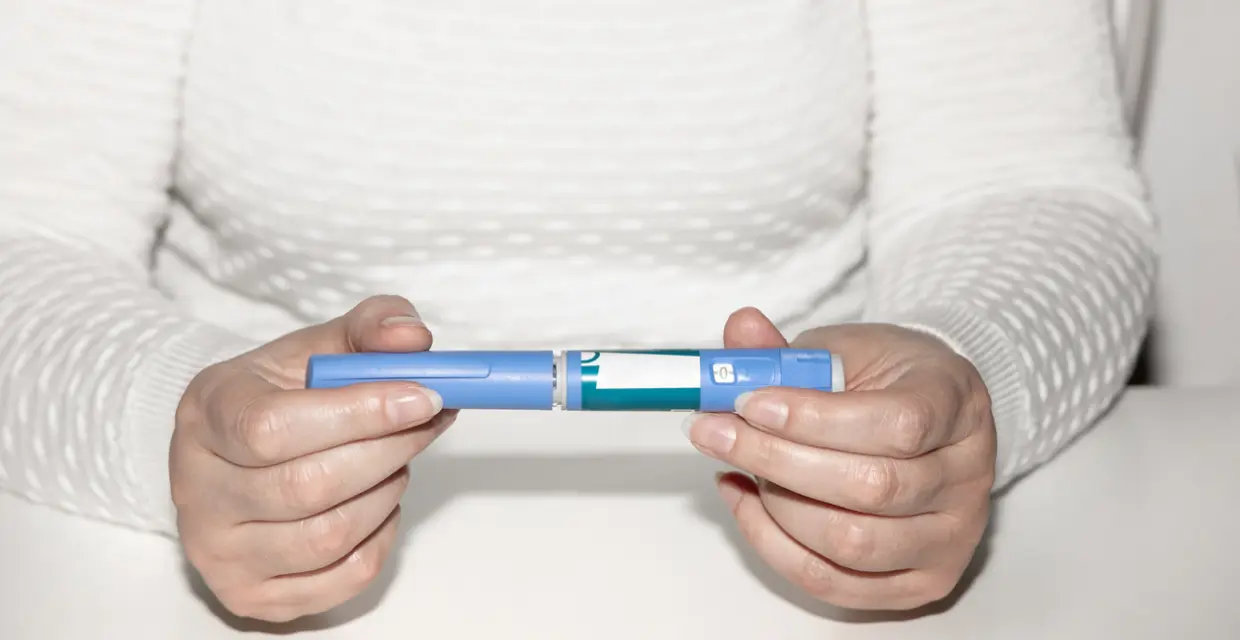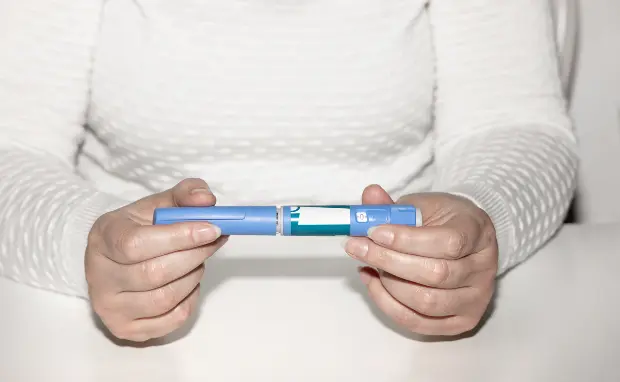Key points
- Wegovy takes about 5 weeks to completely clear from your body due to its 7-day half-life
- No traditional drug withdrawal symptoms occur, but appetite returns, and weight regain is common
- A dietitian can create personalized strategies to help maintain your progress long-term
Wegovy, the weekly semaglutide injection for weight loss, does not leave your system immediately when you stop taking it.
The medication is eliminated slowly, and learning about this process can help you plan your next steps and manage your weight after Wegovy.
How does Wegovy work?
Wegovy is a popular weight loss medication containing semaglutide as its main ingredient. It mimics a natural hormone called GLP-1 that controls appetite and blood sugar.
The FDA approved Wegovy for weight loss in obese or overweight adults with weight-related health problems. In 2024, it was also approved to reduce the risk of serious heart issues in adults with heart disease and excess weight.
"Wegovy works in three ways," explains Gia Eapen, MD. "It slows digestion so you feel full longer, reduces hunger signals in your brain, and helps release insulin to control blood sugar. It works best combined with healthy eating and regular physical activity."
Wegovy is given as a once-weekly injection just under your skin. You can inject it in your belly, thigh, or upper arm.
How long does Wegovy stay in your system?
Wegovy stays in your system for approximately 5 weeks after your final injection. This timeline can vary slightly based on individual factors.
The reason Wegovy remains in your system for this long is its half-life. The half-life is the time it takes your body to eliminate half of a medication.
Semaglutide, the active ingredient in Wegovy, has a half-life of approximately 7 days. If you inject 2.4 mg on Monday, you'll have about 1.2 mg remaining the following Monday, then 0.6 mg after another week.
Complete elimination typically requires about five half-lives. Since semaglutide has a 7-day half-life, it takes about 5 weeks to be fully eliminated from your body after your last dose.
Factors affecting Wegovy clearance
Several factors can affect how quickly your body eliminates Wegovy. While mild to moderate kidney or liver impairment doesn't require dose adjustment, the medication is metabolized gradually throughout the body and eliminated through several routes.
Eapen, MD, explains, “If your kidneys or liver aren't functioning properly, it may take longer for Wegovy to be eliminated. Your digestive system plays a role because the drug is excreted through urine and bowel movements. Body weight can also impact elimination time, as heavier individuals may have longer clearance periods due to drug distribution in body tissues.”
The duration of Wegovy use and your dosage are additional factors that can potentially influence the elimination timeline.
Side effects may begin to improve about 1 week after stopping, although the medication remains in the system longer.
When you stop taking semaglutide, your appetite may return as your stomach begins emptying food faster again, and some people may regain weight after discontinuing the medication.
What happens if you stop taking Wegovy?
Your body will experience some changes after stopping Wegovy.
1. Appetite comes back
The biggest change you'll notice is your appetite coming back. While you're on Wegovy, it reduces your appetite and helps you feel full longer. Once you stop, these effects gradually go away. You may start to feel hungrier and think about food more often after starting Wegovy.
2. Weight regain
Weight regain is something many people worry about, and for good reason. One study found that people who stopped taking their weekly 2.4 mg semaglutide shots regained roughly two-thirds of their lost weight within a year.
It is important to keep up the healthy eating and exercise habits you built while on Wegovy and stay committed to those lifestyle changes to try to minimize weight regain .
3. Blood sugar changes
“While Wegovy is primarily prescribed for weight loss, some people may also see improvements in their A1C levels while taking it”, notes Eapen, MD. “If you have type 2 diabetes, your blood sugar levels might go up after you stop Wegovy. You'll need to watch your blood sugar levels closely after stopping Wegovy and work closely with your healthcare provider."
4. Digestive effects
Some people notice their digestion feels different for a while. Your stomach goes back to its normal speed after months of working more slowly, which can feel a bit odd at first.
5. Cardiovascular impact
Since Wegovy is approved to lower the risk of severe heart problems like heart attacks and strokes in adults who are overweight or obese, stopping the medication may increase your cardiovascular risk.
If you have heart disease, it's especially important to talk with your healthcare provider before discontinuing Wegovy so they can monitor your heart health and adjust your treatment plan accordingly.
Do you experience withdrawal symptoms after stopping Wegovy?
Wegovy is not known to be an addictive substance, so you may not experience traditional drug withdrawal symptoms like anxiety, tremors, or cravings for the drug.
However, stopping Wegovy does lead to changes in your body, including weight gain.
When you stop taking semaglutide, your appetite returns because your stomach starts emptying food faster again. Most people notice these changes within one to two weeks after their last dose.
While these aren't withdrawal symptoms, they can feel significant as your body readjusts.
Always consult your healthcare provider before stopping Wegovy. They can guide you through the transition and help you maintain your weight loss through diet, exercise, and, if needed, different medications.
Maintaining your weight loss after Wegovy
Stopping Wegovy doesn't mean your weight loss journey ends. What you do after stopping is just as important as what you did while taking the medication.
Diet and exercise become the main tools for managing your weight.
Registered Dietitian, Rita Faycurry, RD, says, “While Wegovy helped control your appetite, you'll now need to rely on the healthy habits you built during treatment. The most successful approach uses the time on medication to build sustainable habits that support your health, whether you eventually stop the medication or continue it long-term.”
How can a dietitian help?
Working with a registered dietitian can make a significant difference during this transition.
They can create a personalized eating plan that fits your lifestyle, and help you:
- Understand proper portion sizes
- Find healthy alternatives to your favorite foods
- Learn meal-planning strategies
- Smart grocery shopping within your budget
- Navigate social situations involving food
Tips to manage diet after stopping Wegovy
Here are some strategies to help you manage your weight without Wegovy:
- Focus on a balanced weight loss diet that includes whole vegetables, lean proteins, and whole grains.
- Watch your portion sizes, since your appetite will return to normal levels.
- Many people find success by setting small, realistic goals. Instead of trying to be perfect, focus on being consistent. Take lunch from home instead of eating out to control sodium, sugar, and fat intake, as well as portion sizes.
Importance of exercise
Regular physical activity is equally crucial. The US CDC recommends at least 150 minutes of moderate-intensity aerobic activity each week, such as brisk walking, or 75 minutes of vigorous-intensity activity.
Adults should also engage in muscle-strengthening activities on 2 or more days a week. This could be swimming, cycling, or any activity you enjoy.
Maintaining weight loss is about creating sustainable habits that work for your life. The healthy routines you build while taking Wegovy and continue afterward set you up for lasting success.
Final thoughts
Knowing how long Wegovy stays in your body helps you make informed decisions about your treatment. The medication takes approximately 5 weeks to completely clear from your system after your last dose.
If you're considering stopping Wegovy, consult your healthcare provider first. Research shows that gradually tapering medication while focusing on lifestyle changes is more effective than abrupt discontinuation. Your provider can help create a transition plan to maintain your progress.
Wegovy is intended for long-term weight management, as obesity is a chronic condition. Lasting results come from building healthy habits while on the medication and maintaining them afterward.
Frequently asked questions (FAQs)
Does Wegovy wear off in a week?
No, Wegovy does not completely leave your body in one week. The medication takes about 5 weeks to clear your system fully.
However, you may notice changes within the first week after stopping. As the drug concentration drops, its effects begin to weaken. Most people experience increased hunger as the appetite suppression fades. Side effects typically begin to improve during the same period as medication levels decrease.
How long will it take for Wegovy to leave your system?
Wegovy takes approximately 5 weeks to completely leave your system after your final dose. Individual factors may affect this timing. For example, kidney function, liver health, and metabolism can slightly shorten or extend the 5-week window.
What happens after you quit Wegovy?
Several changes occur after stopping Wegovy. Your appetite returns to normal as the medication's hunger control wears off. Weight regain is common, especially without maintaining healthy habits. If you have diabetes, your blood sugar levels may rise. You will need to adjust your diabetes management accordingly.
Talk to your doctor before stopping Wegovy to create a solid transition plan.
How to flush semaglutide out of your system?
There is no safe way to speed up how fast semaglutide clears from your system. Your body eliminates the medication on its own schedule. Attempting to rush this process could be dangerous. If you are experiencing severe side effects, contact your doctor. They can help manage symptoms and may recommend gradually lowering your dose rather than stopping abruptly.
Find the best weight loss dietitian near you, covered by insurance.
The views expressed by authors and contributors of such content are not endorsed or approved by Fay and are intended for informational purposes only. The content is reviewed by Fay only to confirm educational value and audience interest. You are encouraged to discuss any questions that you may have about your health with a healthcare provider.
Sources
Fay Nutrition has strict sourcing guidelines and relies on peer-reviewed studies, academic research institutions, and medical associations. We avoid using tertiary references.
- Mechanisms of GLP-1 Receptor Agonist-Induced Weight Loss: A Review of Central and Peripheral Pathways in Appetite and Energy Regulation (May 17, 2025)
https://www.sciencedirect.com/science/article/pii/S0002934325000592 - Semaglutide (February 11, 2024)
https://www.ncbi.nlm.nih.gov/books/NBK603723/ - Wegovy (Semaglutide) Injection, For Subcutaneous Use. Initial U.S. Approval (2017)
https://www.accessdata.fda.gov/drugsatfda_docs/label/2024/215256s015lbl.pdf - FDA news release (March 8th, 2024): FDA Approves First Treatment to Reduce Risk of Serious Heart Problems Specifically in Adults with Obesity or Overweight
https://www.fda.gov/news-events/press-announcements/fda-approves-first-treatment-reduce-risk-serious-heart-problems-specifically-adults-obesity-or - Weight Regain And Cardiometabolic Effects After Withdrawal Of Semaglutide: The Step 1 Trial Extension (May 19, 2022)
https://pmc.ncbi.nlm.nih.gov/articles/PMC9542252/ - US CDC: Adult Activity: An Overview (Dec 20, 2023)
https://www.cdc.gov/physical-activity-basics/guidelines/adults.html











